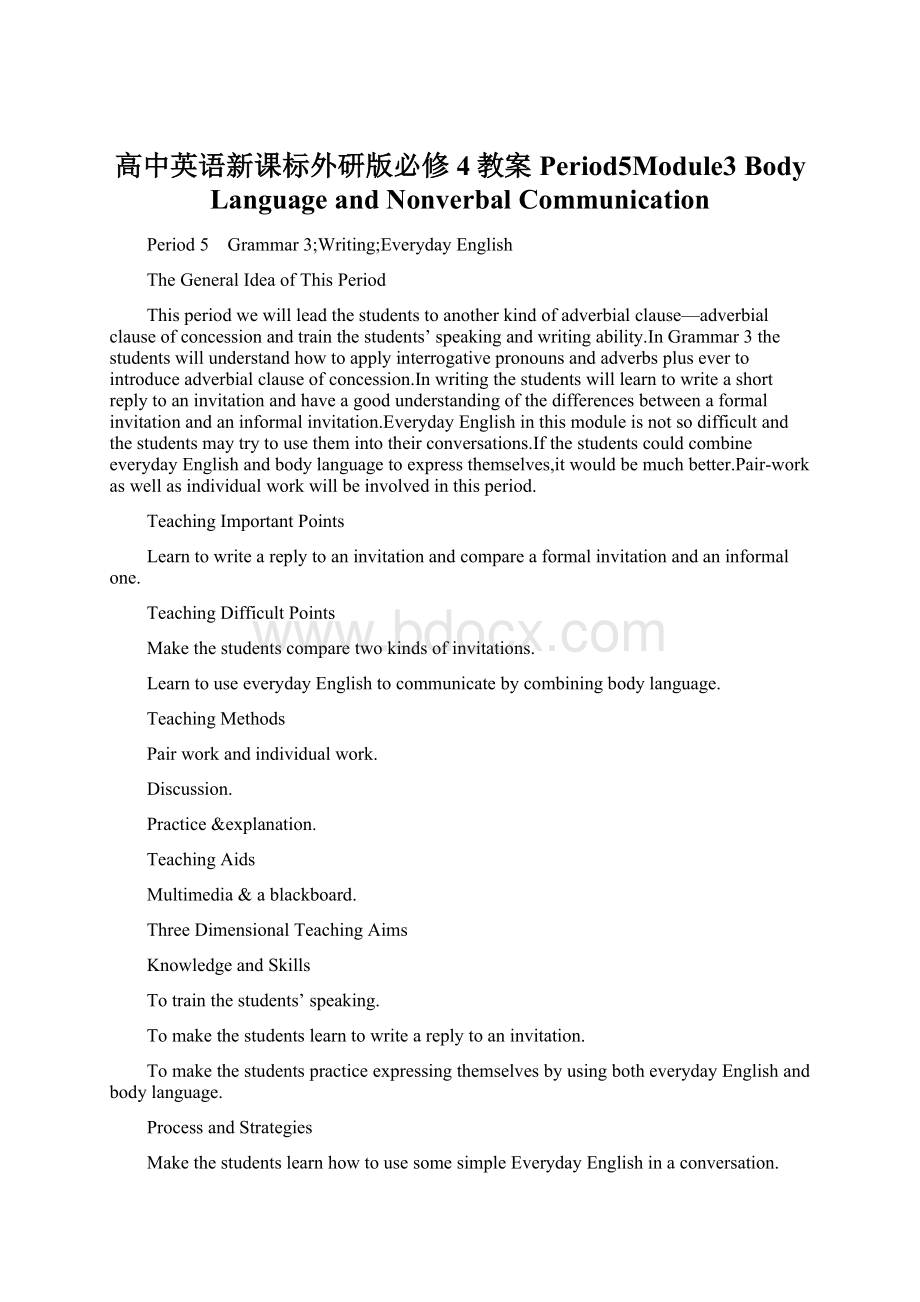高中英语新课标外研版必修4教案 Period5Module3 Body Language and Nonverbal Communication文档格式.docx
《高中英语新课标外研版必修4教案 Period5Module3 Body Language and Nonverbal Communication文档格式.docx》由会员分享,可在线阅读,更多相关《高中英语新课标外研版必修4教案 Period5Module3 Body Language and Nonverbal Communication文档格式.docx(18页珍藏版)》请在冰豆网上搜索。

ThreeDimensionalTeachingAims
KnowledgeandSkills
Totrainthestudents’speaking.
Tomakethestudentslearntowriteareplytoaninvitation.
TomakethestudentspracticeexpressingthemselvesbyusingbotheverydayEnglishandbodylanguage.
ProcessandStrategies
MakethestudentslearnhowtousesomesimpleEverydayEnglishinaconversation.
Throughtheanalysisofthestepsinwritingashortreplytoaninvitation,thestudentsmaylearnsomestrategiesinwritingcomparisons.
FeelingsandValue
Throughthestudyofthisperioddeepentheirunderstandingofdifferentcustomsandcultureofdifferentcountriesandareas.
TeachingProcedures
Step1Revision
(Greetthestudentsasusual.)
Checktheirworkbookexercises.
Haveadictation:
communication,aggressiveunconsciousthreateninginvolvedealspreadgiveawayholdupinformaletc.
Step2Grammar3AdverbialClauseofConcession
T:
Goodjobs,allofyou!
Inlastperiodwehavelearnedsomethingmoreaboutadverbialclauseofcondition.Remember?
Ss:
Yes.Itintroducestwosituations—anormaleverydaysituationandapossibilityinthefuture.
Verygood!
Thisperiodwe’lllearnanotherkindofadverbialclause,thatis,adverbialclauseofconcession.Pleaselookatthescreen.
(Showthefollowingsentencesonthescreen.)
1.Whateveryoudo,don’tleaveimmediatelyafterthemealisfinished.
(a)Itisimportanttoleaveimmediatelyafterthemealhasfinished.
(b)Don’tdoanythingafterthemealhasfinished.
(c)Youcandoanythingyoulikeafterthemealhasfinished.
(d)Itisimportantnottoleaveimmediatelyafterthemealhasfinished.
2.Howeverhungryyouare,youshouldn’tstarttoeatbeforeyourhostdoes.
(a)Ifyouareveryhungryyoucanstarttoeat.
(b)Evenifyouarehungryyoushouldwait.
(c)Itisimportanttostarteatingbeforeyourhost.
(d)Don’teatanythingifyou’renothungry.
Readthesentencesandchoosethecorrectmeaning.Youcandiscusswithyourpartnerifyouhavedifficultyinunderstandingthem.
(Afterashortdiscussioncallbackthestudents’answersbyaskingonestudentstoreadthesentenceandanothertoreadthecorrectdefinition.Thenshowtheanswersonthescreen.)
Suggestedanswers:
1)d 2)b
Welldone.Canyousummarizethegrammaticalrulesofthisadverbialclausethroughthisexercise?
Sa:
Sometimestheadverbclauseisplacedatthebeginningofthesentence.Whenitintroducesthesentence,itisalwayssetoffwithacomma.
Quietright.Anydifferentidea?
Sb:
Ithinkthattheinterrogativepronounsactasobjectintheclause,however,interrogativeadverbsonlymodifyadjectivesorotheradverbs.
Goodsummary,ha?
Let’shaveabrainstorm.Pleasethinkofasmanyinterrogativenounsandadverbsendedwitheverasyoucan.
(Thestudentssaythesewordsandtheteacherwriteontheblackboard.)
interrogative
pronouns
whoever
whichever
Haveknowninterrogativepronounsandadverbs,let’spracticeusingthem.Herearesomesentencesonthescreen.Discusswithyourpartnerandfillintheblankswithwhoever,whenever,whereverorhowever.
(Theteachershowsthesentencesonthescreen.)
1.__________Ifeellonely,Ithinkaboutyou.
2.__________heis,heisveryrudetome!
3.__________Igo,Ialwaysmeetinterestingpeople.
4.Youcaninvite__________youliketotheparty.
5.__________lateyouarrive,I’llcomeandmeetyou.
6.Ifeelshy__________shesayhellotome.
7.Ihearthatsong__________Iswitchontheradio.
8.__________muchIstudy,Ifindtheseexercisesdifficult.
(Afewminuteslater.)Areyouready?
Therightanswersareonthescreen.Youcheckthembyyourself.ThentranslatethemintoChinese.
(Theteachershowstherightanswersonthescreen.)
1.Whenever 2.Whoever 3.Whenever 4.whoever 5.However 6.whenever 7.whenever 8.However
Step3Writing
Youallgivewonderfulperformances.Nowfollowmetothenextpart—Writing.Readtheinvitationsandanswerthequestionsonthescreen.
(Showthequestionsonthescreen.)
1.Whoisthefirstinvitationfrom?
2.Whoisthesecondinvitationfrom?
3.Whichisformalorinformal?
Howdoyouknow?
(Afewminuteslater.)Haveyoufinishedyourreadingyet?
Yes.
Question1,whogivesyouranswer?
S:
Letmetry.ThefirstinvitationisfromMr.&
Mrs.Harry.
Good.Sitdown,please.Whataboutthesecondone?
Inmyopinion,itcomesfromSylvia.
Completelytrue.Thelastquestionmightbealittlebitdifficult.Anyvolunteer?
Me.AsfarasIamconcerned,thefirstinvitationisformalbecausethelanguageisformal.
Thanksalot.
Step4EverydayEnglish
Thewritingpracticegivesusachancetocontacttwodifferentstylesofinvitations,thatis,formalandinformal.Choosingtherightlevelofformalityisimportantonsocialoccasions.ForexampleGoodmorningisformal,butHiisveryinformal.Nexttimeyoulistentoaspeechinaconversation,trytoguessifitisformalorinformalbythewordspeopleuse.Youcanthenusetheminsimilarsituations.Whenwetalkwithforeignerswemayoftenbeconfusedbywhattheysay.Forexample,ifwehearsomebodysay“Maryhasgonebananas.”maybewe’llbepuzzled.Butactuallyhemeans“Maryhasgonemad.”SometimesitisdifficultforustomakesenseofsomeEnglishexpressions.Herearemoreexamples.Readthemthroughanddecidewhattheymean.Ifnecessary,youcandiscusswithyourpartner.
(Showthephrasesonthescreen.)
1.CanIaskyouafavour?
A.CanIdosomethingforyou?
B.Canyoudosomethingforme?
2.Howareyoudoing?
A.Howareyou?
B.Whatareyoudoing?
3.WhatonearthcanItalkabout?
A.There’slotstotalkabout.
B.Idon’tknowwhattotalkabout.
4.Haveagreattime!
A.Enjoyyourself.
B.Stayalongtime.
(Ashortwhilelater.)Haveyoucatchwhattheymean?
Maybe.
Pairsofguysarerequiredtogiveoutyourchoice.Volunteer?
(Onereadsthephrase,theothersharesyourchoice.)
...
b,a,b,a
Step5Summaryandhomework
Thisperiodfirstwelearnedanotheradverbialclauseandthenwepracticedusingtheformalandinformalexpressionstowriteashortreplytoaninvitation.InEverydayEnglishwelearnedsomeusefulexpressions.Yourhomeworktodayistomakeupadialoguetryingtousetheusefulexpressionswehavelearned.Thisistheendofthisclass.Youaredismissed.
TheDesignoftheWritingontheBlackboard
Module3 BodyLanguageandNon-verbalCommunication
Thefifthperiod
berudetosb.
switchon
request
socialoccasions
RecordafterTeaching
_______________________________________________________________________
ActivitiesandResearch
1PracticemoreEverydayEnglish.
2.Practicewritingformalandinformalstyleinvitations.
ReferenceforTeaching
Grammar
连词
连词在词、短语、从句、或句子之间起连接作用的词,按其在句子中的作用分为并列连词和从属连词。
并列连词表示词、短语、句子彼此之间意义相关,层次相同,句法功能也相同。
从属主要作为语意上分清主次的手段,所谓从属就是把次要的思想内容置于从属地位,从而突出句子的主要思想。
本模块主要介绍引导让步状语从句的从属连词。
让步状语从句由连词though,although,as(尽管),evenif,eventhough,whoever,whatever,whichever,whenever,wherever,however,nomatter+疑问词引导。
例如:
Thoughwewereverytired,wefeltveryhappy.
尽管我们很累,却感到很开心。
Iwillgetthere,evenifIhavetowalk.
我就是走也要走到那儿去。
Sheislovely,eventhoughsheisannoyingsometimes.
尽管有时她挺烦人,但她还是挺可爱的。
Wewillmakeatripeveniftheweatherisbad.
尽管天气不好,我们还是要去旅行。
Nomatterwhatwillhappen,wewillsupportyou.
Whateverwillhappen,wewillsupportyou.
不论发生什么,我们都会支持你的。
Wheneveryoucomeback,donotwakemeup.
Nomatterwhenyoucomeback,donotwakemeup.
不管你什么时候回来,都不要吵醒我。
Hecarriesabookinhispocketwherever/nomatterwherehegoes.
不管他去哪,他都在口袋里装一本书。
1.as引导让步状语从句
as引导让步状语从句,从句部分要用倒装语序。
Childasheis,hecanspeakfluentEnglish.
尽管他是个孩子,英语却说得很棒。
MuchasIlikeit,Iwillnotbuyit.
尽管我很喜欢这东西,我也不会买。
2.although/though
引导状语从句的although和though同义,用法基本相同。
前者较正式,多置于句首;
后者较通俗,口语化,也可置于句末。
Hedidn’tlightthefirethough/althoughitwascold.
Althoughheisquiteold,hestilljogseveryday.
Hesaidhewouldcome;
hedidn’t,though.
Hedidn’ttellmewherehehadbeen,butIknowit,though.
引导倒装的让步状语从句只能用though。
MuchthoughIloveit,I’llnotbuyit.
注意:
二者皆不可与并列连词but连用,但可与yet/still连用。
Thoughthesorebehealed,yetascarmayremain.(谚)
伤口虽然愈合,但伤疤留下了。
3.however/but
两者都表示转折”但是”,但词性不同。
however作此意讲是副词,故不能连接并列分句而需另起一句,且位置灵活;
but是并列连词,可以连接并列分句。
Theproblemwasdifficult,however,Iworkeditout.
Iboughtmysisterashirt,butshed